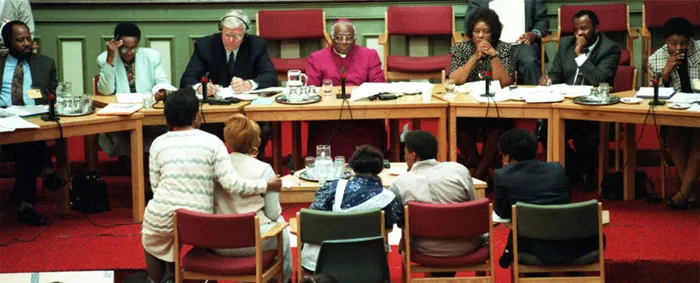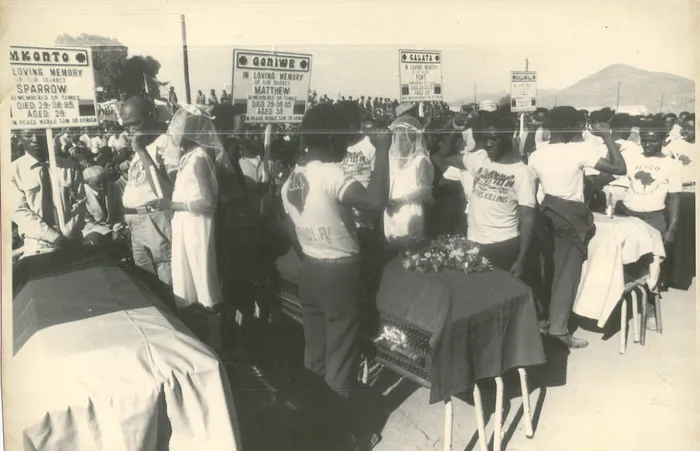Justice deferred: The ongoing struggle for accountability and closure
THE TRC'S UNFINISHED BUSINESS

At the first sitting of the Truth and Reconciliation Commission, in East London in April 1996, chairman Archbishop Desmond Tutu and deputy chairman Alex Boraine hear evidence from the family of the Cradock Four, Mathew Goniwe, Fort Calata, Sparrow Mkonto and Sicelo Mhlauli, who were tortured and murdered by the apartheid state's security police while on their way home from a meeting on the night of June 27, 1985. South Africa has failed to deliver justice for the very victims whose voices were courageously amplified during the TRC process, says the writer.
Image: Independent Media Archives
Dr Reneva Fourie
Yet another unfulfilled promise of democratic South Africa is the failure to wholly implement the Truth and Reconciliation Commission (TRC) recommendations.
On 30 April 2025, President Cyril Ramaphosa announced the establishment of a Judicial Commission of Inquiry to determine whether attempts were made to suppress investigations or prosecutions of apartheid-era crimes referred by the TRC to the National Prosecuting Authority.
This long-overdue response to long-standing demands from victims’ families and civil society is far from sufficient. It is, in fact, symbolic of the broader pattern of delayed justice and deferred accountability that has plagued our post-apartheid country.
Established in 1995 to uncover the truth about human rights violations committed between 1960 and 1994, South Africa’s TRC opened many wounds but failed to provide adequate healing and closure. The transparent process, which made a great effort to maximise public participation, promoted a critical restorative justice approach as an alternative to the narrow retributive justice of the apartheid era.
It could have been a tool for significant moral and symbolic accountability were it not for the reality that so many apartheid forces reneged on fully disclosing the atrocities they committed while others escaped liability.
South Africa has failed to deliver justice for the very victims whose voices were courageously amplified during the TRC process. Successive governments have allowed justice to wither. Prosecutions were shelved. Recommendations were ignored. Reparations were piecemeal. Families of victims were forced to become litigators, pleading their cases in courtrooms rather than finding peace through the state that promised to stand for them.
The newly announced Judicial Commission is, in part, a response to the frustration expressed by affected families and civil society organisations who have waited more than two decades for the prosecution of apartheid-era crimes. These are not minor procedural delays.
They represent a systemic failure of the state to follow through on its own moral and legal commitments. The TRC made clear and actionable recommendations, including referrals for prosecution of individuals who were denied or never applied for amnesty, as well as reparations for victims. Yet successive governments have done little to meaningfully implement them.
The decision to investigate whether there was political interference in the delay of prosecutions is necessary, but let us be honest: it is the bare minimum. It is also painfully late. A commission to investigate why previous recommendations have not been implemented risks becoming yet another bureaucratic holding pattern – a tick-box exercise designed to placate the public while doing little to disrupt entrenched impunity.
South Africans are patronisingly humoured with the statement, ‘The President respects the decision of the families to continue to seek an order on the violation of their rights and constitutional damages through the courts’. In truth, the Presidency could have avoided such condescending remarks directed at individuals with limited resources and nearly no power.
This attitude merely stifles their voices and reinforces bourgeois dominance. It shifts the responsibility back to families who are already struggling, asking them to navigate a complex and costly legal system in a quest for what the state should have ensured for them decades ago. This reflects the government’s continuous retreat from its responsibilities and mirrors a broader pattern of indifference among the privileged towards the suffering of the marginalised.
The TRC was not only a platform for truth-telling. It was a social contract between the new democratic state and the people of South Africa. It was a promise that the horrors of the past would not be forgotten or ignored. That perpetrators who failed to tell the truth would be held accountable. That victims would receive reparations and the recognition they deserved. That the wounds of apartheid would be tended to – not only with words but with real, material support and justice.

The funerals of the Cradock Four, Mathew Goniwe, Fort Calata, Sparrow Mkonto and Sicelo Mhlauli. More than 16,000 people in 160 buses, and thousands more in private cars and bakkies, descended on Cradock for the funerals of the community leaders on July 20, 1985.
Image: Independent Media Archives
Yet, what we have seen instead is a suppression of memory and a betrayal of justice. Perpetrators have lived out their lives in peace. Victims have died in poverty, trauma unresolved, and dignity denied. Vital witnesses have passed away, taking with them the secrets of torture chambers, extrajudicial killings and forced disappearances. Each year that passes makes prosecution harder, not only legally but morally, because the impression left is that the state no longer cares or never truly did.
At this late hour, another commission is not enough. South Africans deserve the integrity that the promises made in our name be honoured. We want action. The prosecution of apartheid-era crimes and the implementation of reparations must proceed concurrently with any investigation into obstruction. Time is not a luxury that the victims have. Every delay is a denial of justice.
Moreover, reconciliation must go beyond symbolism and rhetoric; it must include material redress. Healing is impossible when the state treats their quest for rectitude as a burden rather than a duty, when perpetrators roam free and when victims remain unheard and impoverished. Economic justice must be central to any genuine reconciliation process, as the legacy of apartheid is not only political but deeply economic. Without redistributive measures that address economic disparity and restore dignity to those harmed, the wounds of the past cannot fully heal.
We must resist the temptation to view the TRC as a completed project or a historical artefact. Its promises are still very relevant. To leave them unfulfilled is to degrade the moral foundation of our democracy. It is to send a clear message that impunity triumphs over accountability and that the suffering of the oppressed can be negotiated away.
The TRC findings are not just about the past. It is about the present and future of social cohesion and fairness in South Africa. It is about whether democracy can coexist with memory, whether truth has power, and whether the state serves all of its people or just the powerful few. The time for inquiries and platitudes is over. We need the political will to fulfil the promises the TRC made, promises written not just in reports but in the broken lives and unhealed scars of South Africa’s people.
* Dr Reneva Fourie is a policy analyst specialising in governance, development and security.
** The views expressed in this article do not necessarily reflect the views of IOL, Independent Media or The African.